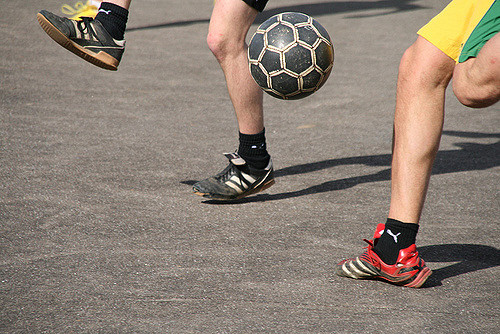
Most kids in youth sports are in it to have fun, stay active and learn valuable social and competitive skills to help them throughout the rest of their lives. But some kids have exceptional athletic abilities. If you’re a parent to an exceptionally talented young athlete, it’s just as important to keep them grounded in reality as it is to nurture their gifts. What can you do to maintain that delicate balance? Follow these five tips.
1. Encourage Healthy Competition
Why healthy competition? Because no matter how talented your child is, there is always someone better. There is always more to learn. Even great athletes lose sometimes. Healthy competition gives kids a way to measure their talents against other skilled competitors. It also teaches them an important life lesson — sometimes they’ll win, sometimes they’ll lose. Learning how to lose is just as important as learning how to graciously win.
How can you tell if a competition is healthy? As blogger Alex Perdikis explains in a recent post, warning signs of unhealthy competition include too much emphasis on winning, prizing individuals over teamwork, encouraging rough play and unchecked bullying behavior.
Talented athletes require the checks and balances of healthy competition, however, to encourage growth and maturity.
2. Avoid Added Pressure
Most talented and driven kids put a lot of pressure on themselves. As a parent, you don’t need to add to it. If your behavior suggests that winning is the most important goal or that a loss is a tragedy, you add tremendous pressure and misery to your child’s life. Unfair pressure not only harms the child’s health, it also removes the fun. Support your child win or lose. Encourage your child to look at a loss as a learning experience. Keep it fun or even the most gifted athlete will become discouraged. Positive motivation is the key.
3. Branch Out
If your child has a natural ability, it’s easy to fall into the trap of focusing on a single activity. Look around at professional sports opportunities, though, and you’ll see only a small percentage make it big. Medal-winning Olympians may get sponsorships and recognition for a time, but all the attention — and money — fades fast. You and your child both have to face that fact that it’s likely athletic talent will not be enough to thrive in today’s world. You need a fallback plan. Don’t focus every bit of your child’s energy on a single activity.
4. Goals Are Good — If They’re Realistic
Working with your child to set goals, such as running faster or hitting better is absolutely necessary for the child to improve skills and become even better. If the goals are unrealistic, however, goal setting causes more frustration than anything. Try to set up a scenario where the child will succeed at times and gradually move them to higher levels to raise the bar. Becoming an Olympian may, in fact, happen at some point, but if that’s the goal you have for your child from day one, you’re making a huge mistake.
5. Listen
Listening involves more than hearing what a child says. It also means recognizing the body language, mood and activities that indicate a young athlete is dealing with too much. Engage your child in activity related discussions, of course, but you know your child better than anyone. Sometimes, it’s what they don’t say that’s most important. Pay attention.